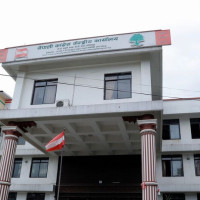- Monday, 15 December 2025
Services in Damauli Hospital affected in lack of specialist doctors
By Amar Raj Naharki,Tanahun, May 18: The maternity services at Damauli Provincial Hospital, a district-level healthcare institution in Tanahun, have been severely affected due to the absence of a specialist doctor.
According to Dr Paribartan Baral, the hospital's Medical Superintendent, the situation arose after gynaecologist Dr. Kumar Bisht was transferred to the Cancer Hospital in Bhaktapur three months ago. In his absence, pregnant women requiring surgical intervention are now being referred to Pokhara, Chitwan or Kathmandu for treatment.
While the hospital continues to provide regular maternity care for normal cases, it has become a daily compulsion to send patients needing caesarean sections to other cities.
Dr. Baral stated, “We have informed the concerned authorities about the disruption in services due to the lack of a gynaecologist, but no action has been taken so far.” He added that in the absence of a surgeon, at least one patient a day must be referred to other hospitals for treatment.
Despite having only 15 beds, the hospital has been providing healthcare services equivalent to a 50-bed facility. As a district-level institution, it caters not only to residents of Tanahun but also to patients from neighbouring districts such as Gorkha, Lamjung and parts of Kaski.
Meanwhile, Damauli Provincial Hospital is also facing significant challenges due to non-payment of health insurance reimbursements. The delay in receiving nearly Rs. 57 million from the Health Insurance Board has put immense strain on the hospital’s operations.
Likewise, he expressed concern that the hospital may be forced to suspend insured treatments due to the financial crisis. “We are struggling to manage medical expenses and procure necessary supplies,” he said. “The lack of reimbursement over a prolonged period has made it impossible to purchase essential medicines and health materials.”
The hospital is required to provide not just medications, but also laboratory tests and surgical services under the insurance scheme, further increasing the financial burden. On average, the hospital receives more than 350 patients daily, with 80 to 90 per cent covered by health insurance, according to Baral.
“The situation has become critical. Without timely reimbursements, we are no longer able to deliver treatments,” he said. Suppliers of medical supplies, who have not been paid for a long time, have now warned that they will halt deliveries, worsening the hospital’s crisis.
The hospital has reported that the supply of materials necessary for kidney dialysis is also on the verge of cessation, putting patients’ lives at risk.
Despite corresponding with the Health Insurance Board regarding the hospital’s financial troubles and the warnings from suppliers, the response has been indifferent, said Baral. The hospital has yet to receive any reimbursement for the current fiscal year, resulting in a worsening shortage of medicines.
Due to the prolonged delay in clearing dues, the hospital has been unable to place new orders for essential pharmaceuticals.
















